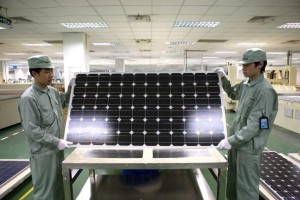Commerce Department Announces Small Tariffs On Chinese Solar Panels
 After months of speculation and debate about unfair Chinese subsidies to domestic solar manufacturers, the U.S. solar industry finally has an answer to one piece of the ongoing trade case: Solar panels imported from China will be hit with a small tariff.
After months of speculation and debate about unfair Chinese subsidies to domestic solar manufacturers, the U.S. solar industry finally has an answer to one piece of the ongoing trade case: Solar panels imported from China will be hit with a small tariff.The Department of Commerce issued a preliminary decision today based upon the agency’s impartial review of Chinese subsidies to domestic solar companies.
The tariffs range from 2.9 percent to 4.73 percent — dramatically lower than the 20 percent expected by many industry analysts. It is important to note, however, that today’s decision from Commerce is the first of two key tariff rulings: subsidies and dumping. The second decision on whether Chinese companies are dumping panels into the U.S. market below cost is expected in May.
The complaint was filed in October by SolarWorld and a small group of unnamed solar manufacturers that called themselves the Coalition of American Solar Manufacturers, or CASM. It sparked a contentious debate in the solar industry between upstream panel manufacturers getting squeezed by rapidly falling prices and downstream developers benefiting from cheap equipment.
The Center for American Progress has taken a nuanced stance on the issue — understanding the value of falling solar prices and free trade, but also supporting trade enforcement mechanisms when needed. Melanie Hart, CAP’s China Energy and Climate Policy Analyst, explained the importance of the case in a statement:
Today’s Commerce Department decision to levy import tariffs on Chinese solar panels is a positive step forward in a much larger effort to level the clean energy playing field between the United States and China. I applaud SolarWorld for pursuing this case and utilizing the trade institutions designed to address these types of complaints. Too many U.S. companies avoid filing trade petitions because they fear Chinese government retaliation. When U.S. companies allow those fears to prevail, the end result is tacit accommodation to illegal trade behavior, and that can erode U.S. competitiveness and drive entire U.S. industries out of business.
This countervailing duty (subsidy) tariff is lower than many industry analysts expected. It is important to note, however, that in trade cases where subsidy and dumping petitions are filed in tandem, the dumping tariff is generally the higher import duty. The Commerce Department is expected to issue the SolarWorld dumping determination in May. At this point it is far from clear what the end result of this case will be and how it will impact manufacturers in the United States and China.
One thing that we can say based on this relatively low subsidies tariff is that the Commerce Department did not apply punitive duties in this ruling. Instead, the Commerce Department based this decision on its own review of the evidence and only levied tariffs based on what it could prove. Chinese companies and officials are watching this case very closely, and hopefully this action will serve as an example in China for how these cases can and should be handled impartially and according to law.
The United States and China are the world’s biggest energy consumers. Keeping our borders open to allow and encourage clean energy trade can stimulate competition, speed innovation, and bring down costs to speed our transition toward a clean energy economy. To be equally beneficial for both countries, however, it is critical that U.S. and Chinese companies compete on a level playing field. At present, it is clear that the field is often far from level. Allowing and encouraging U.S. companies to file trade petitions such as this one is critical for correcting that imbalance.
Representing the other side of the issue, Jigar Shah of the Coalition for Affordable Solar Energy (CASE) issued a moderately positive response to the low tariffs. CASE has been openly critical of SolarWorld and the CASM companies, saying the alliance is potentially throwing economic roadblocks in front of the industry:
Today’s preliminary determination by the Department of Commerce imposing low tariffs on imported solar cells and modules is a relatively positive outcome for the U.S. solar industry and its 100,000 employees. However, tariffs large or small will hurt American jobs and prolong our world’s reliance on fossil fuels. Fortunately, this decision will not significantly raise solar prices in the United States as SolarWorld has sought.
This decision clearly demonstrates that the Commerce Department did not find the Chinese government engaged in massive subsidization, as SolarWorld and CASM claim.
There is more work to be done to protect the future of solar industry and power in America. There will be another decision in May when the Commerce Department announces anti-dumping duties. A recent study by the Brattle Group confirmed that placing artificially high tariffs on solar panels would severely undermine the US solar industry, resulting in the loss of up to 60,000 US jobs by 2014.
CASM countered those job loss claims with its own report earlier this month showing that America’s 2010 solar trade surplus with China turned into a gaping $1.6 billion deficit last year.
With so much at stake for both sides of the rapidly growing solar sector, the war of words between manufacturers and developers will likely continue well into the spring.
You can return to the main Market News page, or press the Back button on your browser.

